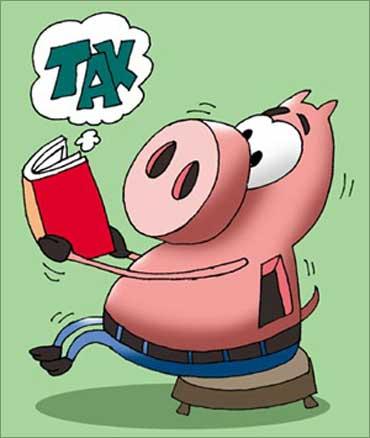
Saving income tax is very essential in one's financial management. Thus tax planning is an essential part of one's financial planning. Efficient tax planning enables you to reduce your tax out‐go to the minimum.
This is done by legitimately taking advantage of all tax exemptions, deductions rebates and allowances while ensuring that your investments are in line with your long term goals.
If you are looking to invest your money in order to save income tax, you should choose the right tool to ensure that it suits your needs and also your life goals.
Also, make sure that your investment is proportional to your income. Too much investment for the sake of tax exemption may cause essential money to run out of your hands.
From total taxable income, there is a tax exemption limit of Rs 160,000 for men, Rs 190,000 for women and Rs 240,000 for senior citizens. The following table gives an idea, how much tax is charged as per your income:
| Income Tax Rates/Slab for Assessment Year 2011 | Rate (%) |
| Up to Rs 160,000 Up to Rs 190,000 (for women) Up to Rs 240,000 (for resident individual of 65 years or above) | NIL |
| Rs 160,001 - Rs 500,000 | 10% |
| Rs 500,001 - Rs 800,000 | 20% |
| Above 800,001 | 30% |
...

If anyone's income crosses beyond basic exemption then there are certain ways to save tax. Tax‐saving avenues are provided by the government to reduce the burden on taxpayers and urge them to pay tax and hence help the country.
Following are few tips which will guide you in saving tax.
Know your tax liability: Before trying to find out how much you need to invest in order to save income tax, we need to know how much tax you are liable to pay in the first place. Use the table, and calculate your taxable income.
Use existing investments to avail of deductions: Current year investments, such as contribution to the Employees' Provident Fund, repayment of housing loan and premiums for life insurance and health insurance which recur on a regular basis every year, can be used for deductions under various sections.
But there is limit of Rs 100,000 u/s 80(C) up to which you will avail deduction. Beyond this limit your investment is not eligible for deduction in that section.
Following are few investment tools which are covered u/s 80(C).
Thus, in all, you can save a total of Rs 30,000 u/s 80C alone if you are in 30per cent tax slab.
...

Get a mediclaim: This is an area which remains unutilized while tax planning and investment. Apart from 80(C) you can also avail deduction u/s 80(D) if you are paying health insurance premium for yourself, your spouse, child and dependent parents.
You can avail deduction upto Rs 35,000 i.e. Rs 15,000for your self/spouse/child and additional benefit of Rs 15,000 (Rs 20,000 incase of senior citizen) towards premium for your parents.
Infra bonds: With the announcement of new tax slabs this budget, infrastructure bonds are good propositions to invest. Investment in bond issued by specified infrastructure companies is also eligible for section 80(C) deduction.
But Deduction is available only upto Rs 20,000. This is over and above the basic limit of Rs 100,000.
...

Donation: Income tax also encourages a good cause that is charity or donation made which is covered u/s 80(G).The amount you donate to specified institutions or funds are deductible from your taxable income. The extent of deduction is either 50 per cent or 100 per cent, depending on the institution you donate to.
Additionally, if you are salaried the following juggling your pay components amongst various heads, can help you save tax. Check the following tax havens:
House rent allowance
You can take advantage of the provisions under this section if you are renting an accommodation. These provisions will not be available to you if you stay in a rent‐free accommodation or live with your family or in your owned house.
Under Section 10(13A), HRA is exempt to the least of the following: i) 50 per cent (in metro cities) or 40 per cent (in other cities) of basic salary + Dearness Allowance (if, applicable), ii) excess of rent paid over 10% of basic salary; and iii) actual HRA received.
Transport allowance
Transport allowance granted for commuting between your residence and place of work is exempt up to Rs 800 per month and Rs 1,600 per month in case of handicap. You can take advantage of this provision to get a tax exemption of Rs 9,600 annually by providing your employer with bills or a self declaration.
...

Children education allowance:
You can also claim upto Rs 100 per month per child, upto 2 children on expenditure incurred on education fees.
Medical reimbursement
You can claim exemption up to Rs 15,000 annually on actual expenditure incurred on your medical treatment or for treatment of any of your dependants. Moreover, there is no restriction of approved hospitals or clinic for the same.
This is exempt only on provision of actual bills.However; if the amount is paid out as an allowance not a reimbursement then it would be fully taxable.
Additionally, you may also claim deduction under following heads too:
Knew you could save so much of your hard earned bucks? Make the most of these tax havens right away.